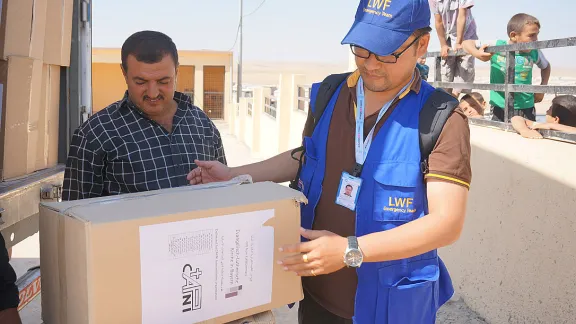
LWF assisting in the distribution of winter clothes sponsored by the Evangelical Lutheran Church of Bavaria in Khanki camp, Northern Iraq. Photo: LWF Iraq
LWF Assists With Shelter, WASH and Winter Clothing
(LWI) – The Lutheran World Federation (LWF) emergency team in Iraq is concerned about how to sufficiently prepare the refugees for the cold season. “We need extra gas stoves and blankets” team leader Dr. Gedeon Saad says.
More than 1.5 million people according to the UN have been internally displaced in Iraq by the advancing military group “Islamic State” (IS). Most of them fled to Northern Iraq into territory controlled by the Kurdish military. LWF through Christian Aid in Northern Iraq (CAPNI) is assisting in the area around Dohuk with non-food items such as shelter, cooking kits, stoves, blankets, carpets and water and sanitation.
“We aim to provide more than 200 families with shelter and a minimum of 3,400 families with winter clothing” Dr. Saad says. About 600,000 internally displaced people (IDP) have been registered in the Dohuk area. Saad estimates that these are only 60 percent of the actual number, as registration is also difficult. Many people are living in old or unfinished buildings without water, sanitation or access to aid and medical care. These “informal settlements” have to be found first.
Others could not bring personal papers. Many of the refugees are registered with the ration card they used to buy food with during the UN sanctions against Iraq. “These cards show all the information, number of family members, children, people with special needs, elderly – we need to know that to properly care for them”, Dr. Saad adds.
As the cold season approaches, winter clothing has become a priority. LWF is assisting in assessing the needs of the families and the distribution of winter kits. “They were not allowed to even take a suitcase”, LWF team leader Saad says. “All their money was taken from them. Many arrive with only the clothes they are wearing”.
Since the beginning of the new school year, the IDPs also had to leave most of the schools where they had found shelter during the summer. “They live in tents now”, Saad says. He is especially worried about people in so-called informal settlements. “They live without the most basic sanitation, and do not know where to receive help” he says.


